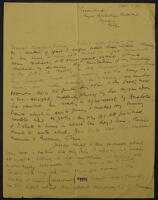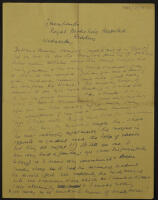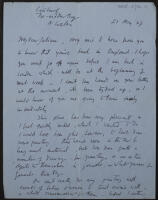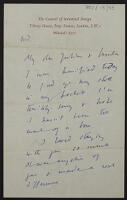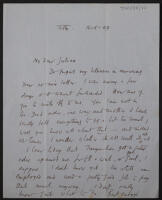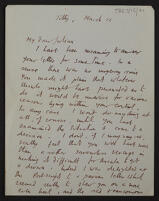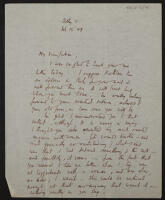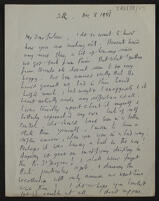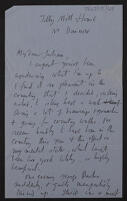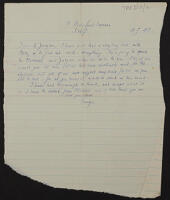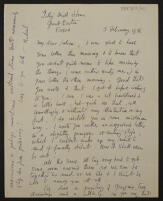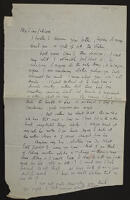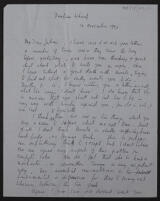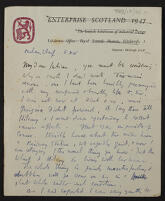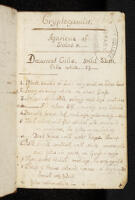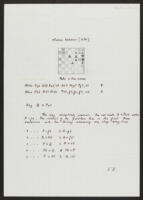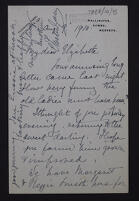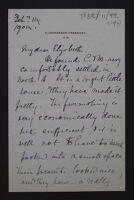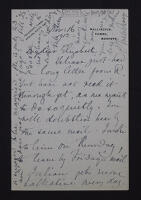Fourways (Gomshall, Surrey).—Is glad he and Nellie enjoyed the celebrations at Witley. Nancy and Bushie visited her yesterday. Discusses various future plans.
With printed message 'I'll not confer with sorrow till to-morrow; But Joy shall have her way This very day'. No message written in by hand. Image of cottage, by Frederick Leighton [sic]. This item may not be from Vishwanath Singh, or it could have originally contained the following item.
Folded sheet, 'Christmas Remembrance' and signature of Vishwanath Singh; on opposite page, image of cottage and hens.
'Greetings. Every Happiness, Every Blessing', signed by Vishwanath Singh.
On headed paper with the arms of Chhatarpur: 'Expecting to hear from you. Having not heard from you for long. I'm anxious'.
Small self-portrait sketch after postscript.
Small self-portrait sketch before signature.
On the fly-leaf are some lines of poetry partly pencilled and then inked over, partly in ink originally. On the fly-leaves at the other end are further fragments in ink and pencil, and one is headed: ‘Plan of a Poem. The Seasons. | Spring. The Visitation, &c.’ Other verses in pencil are on blank pages in the body of the volume, which consists of botanical notes, predominantly on fungi. At the other end is the date 23 Sept. 1793.
Sin títuloWallington, Cambo, Morpeth. - Thanks Elizabeth for her long letter: 'the old ladies' must have been very funny. Hopes she found Julian well. Margaret and Reggie Smith are staying on their way north; he seems sensible and is going to travel to India and so on before 'settling down at the Bank'; Margaret 'has wonderful masses of red hair' which she wears in a strange style [a sketch illustrates this]. Hopes the weather will be good so they can have a picnic; Elizabeth and Robert were not fortunate with the weather for their visit, she loved seeing them and is glad they enjoyed themselves. Likes Robert's poem very much and so does Charlie. [Charles and Mary's] children came on Sunday, with 'little Steven Runciman'; Nora [Trevelyan?] has arrived 'so the Cambo "season" has commenced'. Hears there will be about six hundred people on the 'Liberal Excursion'; hopes they have good weather. Pantlin has gone with her cousin to the seaside. Mrs [Nora] Sidgwick is visiting next week. Hopes Mr Enticknap's journey home went well; she sees Gussie at work [in the gardens] 'looking busy and happy'.
Welcombe, Stratford on Avon. - He is recovering from his illness. There has been great anxiety about Meta [Smith]'s eldest boy [Cyril], who has been 'fearfully ill at Eton with pneumonia'; Meta has been ill too, and now her husband, who has 'very delicate health' has had a dangerous attack of the same illness.
8, Grosvenor Crescent. - Found C[harles] and M[ary] settled at North Street, a 'bright little house' which they have made pretty, furnishing it 'economically' and suitably for a small space; their [wedding] presents looked nice, and they have an excellent book collection. Mary looks very contented, and 'Charlie's hair is curling as it has not done for a long time!'. One of the two small drawing-rooms has two pianos in; if they play them together their neighbours will think it noisy, but 'they are humble folk, & the children who swam in Westminster will come & listen in the street!'. George looks as if he needs a holiday; Caroline is glad the wedding is not far away, on 17 March. Janet looks very happy and says she is busy with her trousseau. Dorothy has returned and said to be 'much better for her journey'. Saw the H[enry] Y[ates] Thompsons yesterday; they start for Sicily tomorrow; Caroline will ask Mrs Cacciola [Florence Trevelyan] to let them see her garden. Asks whether Madame Grandmont [Bramine Hubrecht] would let them call on her; thinks she would like Dolly. Harry is telling people that Caroline and Sir George like their new daughters-in-law, but will not say 'either of them come up to Elizabeth in character or walking!'. Glad he has the right impression, though of course they will all have a 'separate place' in their hearts; Mary is good, sensible, and suits Charles, but 'needs a little polishing'.
If there are things at La Croix which would be suitable for a bazaar at Stratford, asks if Elizabeth could buy her two pounds worth; she can send them by post if she likes. Going today to see if they can find out about Aunt Margaret [Holland]'s health; fears it is her 'old trouble, clots'. Meta [Smith?] has reached Egypt; is said to be better. Very glad life at La Croix suits Robert's work. Caroline has found a cabinet at Stratford which she thinks will suit their new house; asks whether the work on that has begun yet.
Wallington, Cambo, Morpeth. - They have just had a 'long letter from Robert' [in the East] but have not yet read it through; expects Elizabeth will also hear from him. Julian becomes ever more talkative. Miss [Charlotte?] Moberly has been to visit. The hounds are coming this morning; does not know whether Julian will get out as it is raining, but he will be able to see them in the yard from the window. She and Sir George are 'greatly distressed' about the 'shocking row' in the House [of Commons, on Home Rule]. Charlie was here on Thursday night; he has gone today with Mary to Alnwick to speak in the place of E[dward] Grey, who cannot leave London. Their children are coming today to see the hounds, then 'sleep and dine' at Wallington. Nora [Trevelyan] came to lunch and to say goodbye as she is leaving; she looked very shaky. Meta [Smith]'s eldest son Reginald is engaged; he is 23 and does not come of age till he is 25, so Meta will not have to leave Goldings till then. Mary is quite well now.






